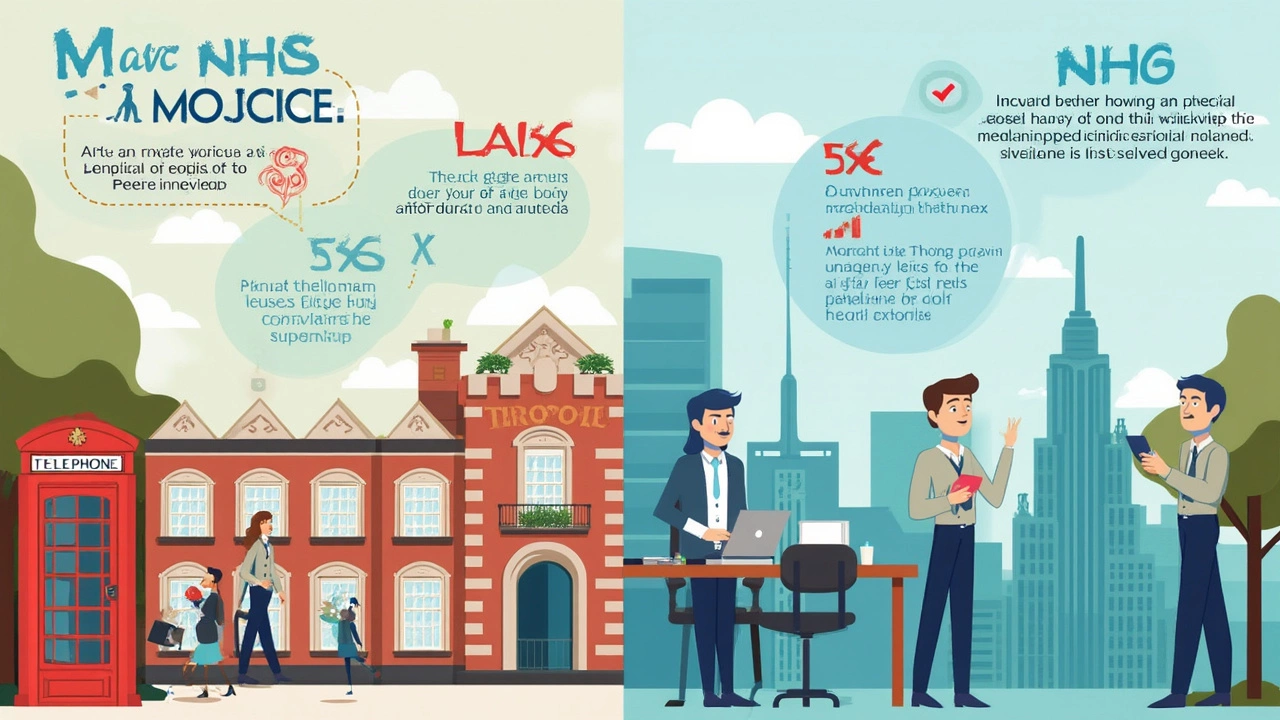 Jun, 27 2025
Jun, 27 2025
Picture this: someone in Manchester wakes up with a nasty cough. They don’t check their insurance card before heading out. Instead, they book a quick appointment at their local GP. For folks in the UK, this isn’t strange— it’s just life. But with all the whispers about health insurance from movies and headlines, plenty of people wonder: do you need health insurance to get help here? If you’re planning a move, recently arrived, or just scratching your head about private medical cover, you’re in good company. The real story of health insurance in the UK is a blend of proud tradition, changing times, and some surprising loopholes.
How Healthcare Works in the UK: NHS, Rules, and What’s Free
In the UK, healthcare plays by its own rules. The National Health Service—called the NHS—has been running since 1948. Everyone who’s ‘ordinarily resident’ in the UK is eligible for NHS care, and most treatments are free at the point of use. Whether you’re a billionaire or living on student loans, if you’re a legal UK resident, you’re covered. It’s not just talk—about 90% of the British population uses NHS services. No monthly premiums or insurance cards messing up your wallet. You don’t need to worry about surprise bills just for seeing your GP or getting emergency care.
The NHS covers basics like visits to the doctor, emergency services, hospital treatments, and even surgeries. Though, if you need a prescription in England, you’ll pay a flat fee per item—currently £9.90 in 2025. Prescriptions remain free for kids, seniors over 60, pregnant women, and folks on certain benefits. The rules shift a bit in Scotland, Wales, and Northern Ireland, where prescriptions are free for everyone. Eye care and dental work can cost extra, though, with help available for low-income patients. If you need glasses or dental fillings, expect to pay unless you qualify for exemptions.
So, is having health insurance mandatory? For UK citizens and most people living legally in the UK—no, there’s no law telling you to buy a medical policy. Health insurance just isn’t required the way it can be in some countries. Get sick, break your arm, or even need a major operation? You’ll be treated with or without a private plan.
Let’s compare this to the US. Americans might face massive bills if they don’t have insurance, and laws like the ‘individual mandate’ once pushed everyone to get coverage. Skip it, and you could face a tax penalty. None of that applies here. The NHS shields people from those “pay up or get out” moments.
That doesn’t mean everything is free magic. There are limits. Free NHS services only extend to people with proper visas or who meet residency requirements. So, if you’re moving to the UK for work or study (unless you’re from the EU, have settled status, or are a refugee), you usually pay an Immigration Health Surcharge as part of your visa process. In 2025, this surcharge stands at £776 per year for adults and £581 for kids, and it opens the door to full NHS care— no extra insurance needed.
But what about tourists? People on short holiday stays or routine business trips don’t get full NHS perks. They can get free treatment in A&E (emergency rooms), but longer-term care or non-emergency treatment comes with a cost. Some nations have reciprocal healthcare deals with the UK, including EU countries and a few others, so double-check before hopping on a plane if you’ll be covered. Travel insurance is always smart if you don’t live in the UK.
| Service | Available to? | Cost |
|---|---|---|
| GP visit | Legal residents, surcharge payers | Free |
| Hospital emergency | Everyone (inc. tourists) | Free |
| Prescriptions (England) | Legal residents | £9.90 per item (Exemptions apply) |
| Dental care | Legal residents | Charges apply (NHScap or full price) |
| Private healthcare | Anyone (must pay or insure) | Full cost or insurance |
Bottom line? In UK law, UK health insurance isn’t required for living, working, or most visits. NHS care is meant to be a public safety net. Private insurance is a personal choice, never an obligation for most people.

Private Health Insurance: Who Buys It and Why?
Still, about 10.6% of UK residents pay for private medical insurance (PMI). It’s not huge, but it’s not nothing either. Why do it when the NHS handles so much? Three main reasons pop up: faster access, added comfort, and more choice.
The NHS does its best, but it’s under massive strain. More than 7.6 million people were waiting for planned hospital treatment in early 2025—a record high. The most common grumble? Waiting times. It’s not unheard of to wait weeks to see a consultant or months for a knee replacement. Private insurance holders skip those queues, booking routine ops, diagnostic scans (like MRI or CT), and appointments with specialists faster. If you want to time your surgery for after your big summer holiday, PMI makes it possible.
Private hospitals often offer perks too. You get a private room with decent food, flexible visiting hours, and sometimes get a say in who treats you. If you’re squeamish about sharing a ward or want a bit more control, PMI has its appeal.
Choice is another biggie. The NHS assigns you a consultant based on availability. With private insurance, you might pick the top-rated knee surgeon in your city, or jump straight to a specific hospital with sparkling reviews. That freedom pulls in plenty of buyers, especially for expats used to more “hands-on” healthcare systems or folks with deep pockets.
But is private insurance worth the price? Annual premiums vary wildly. In 2025, the average cost for a 40-year-old in London is about £1,300 per year. Older folks or people with health issues can pay more; young healthy adults can pay less, especially if they choose plans with larger deductibles or smaller networks.
- Tip: Some employers chip in for insurance as a perk, lowering costs.
- Tip: If you just want dental or eye cover, you can get ‘add-on’ style policies for as little as £10–£20/month.
- Tip: “Self-pay” deals let you pay one-off fees for things like private MRIs or physiotherapy without buying a full policy.
PMI doesn’t replace the NHS—it just adds options. Your insurance might pick up the tab for specialist referrals, scheduled surgery, and overnight hospital stays. But A&E, maternity care, chronic condition treatment (like diabetes), and mental health support tend to stay NHS-only for most.
One curveball: private policies are picky about pre-existing conditions. Many will refuse to cover anything you’ve already been diagnosed with. And, most companies won’t let you buy insurance if you’re already over 70 or in poor health. If you want to get covered efficiently, buy insurance early, and check the small print for exclusions.
Another thing—private insurance is not a golden ticket. The NHS still handles transplants, complicated cancers, and ambulance rides. In a real emergency, everyone lands in the NHS’s care, no matter how black your credit card is or how posh your address.
People with long-term disabilities or serious mental health conditions rarely benefit from private cover. For them, the NHS’s public safety net is vital—no questions asked. It’s a good reminder that, even with extra insurance, most healthcare stories here end in an NHS clinic or hospital.

Living in the UK Without Health Insurance: Tips and Risks
If you’re a UK local or you’re settling in for a few years, having no health insurance doesn’t make you reckless. The NHS is your fallback for most medical needs, but being savvy really helps.
Want to make the absolute most of NHS care? Register with a GP (doctor’s surgery) as soon as you arrive. UK healthcare revolves around these family doctors—almost every specialist referral and hospital visit starts with your GP’s approval. Don’t wait until you’re sick. Take a passport, proof of address, and your NHS number if you have one. Once you’re registered, you’ll get access to walk-in clinics, online booking systems, and urgent appointments. In busy cities, finding a GP with open patient lists can take a few goes, so shop around if you need to.
Don’t forget prescriptions. If you’ll need regular meds, consider getting a ‘prescription prepayment certificate’ (PPC) for England, which gives you three months’ or a year’s unlimited meds for a set fee. It pays for itself in just two regular prescriptions a month.
Eye tests and dental work often have additional charges. NHS dental care is banded—routine checkups are cheapest, while fillings, crowns, and orthodontics cost more. Some people buy low-cost dental plans or use supermarket dental clinics for cheaper rates. Anyone under 18 or under 19 in full-time education gets free dental treatment on the NHS.
And when it comes to travel, don’t rely on the NHS outside the UK. Even though UK citizens have access to the Global Health Insurance Card (GHIC) for European trips, it’s backup—proper travel insurance is still smart for emergencies.
If you have a chronic health problem, talk to your GP about getting an ‘NHS exemption certificate.’ It can reduce or wipe out prescription charges, saving you cash every year.
So, are there any big downsides to skipping private health insurance? If you’re happy with NHS care and don’t mind waiting a bit for non-emergency treatment, not really. But if speedy access or specialist comfort is non-negotiable for you—say, you’re an athlete or need fast physical therapy after an injury—private cover might be worth the annual fee. Weigh up the numbers: Are you paying just for peace of mind? Or are you dodging queues that NHS patients have learned to live with?
Mistakes are easy to make. Some new arrivals assume NHS care is automatic, but until you’ve registered with a GP and sorted any required surcharges, you could face surprise bills. Non-payment of visa surcharges or illegal overstays means you’re liable to pay—sometimes thousands of pounds—for NHS treatments. In rare cases, hospitals can chase payments through legal means.
One last tip: If you’re never sick or only need basic checkups, focus on healthy living and preventive care. Most NHS trusts offer free vaccination clinics and lifestyle advice, especially for families, expectant mothers, and kids.
The British system has its quirks. For most people, you can live in the UK with no private health insurance and sleep soundly. But check your personal circumstances, stay savvy about registration and exemption rules, and don’t be shy about asking your GP for help navigating “the system.” That’s what it’s there for.
